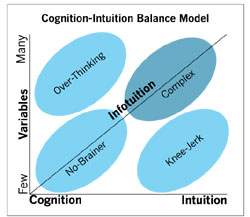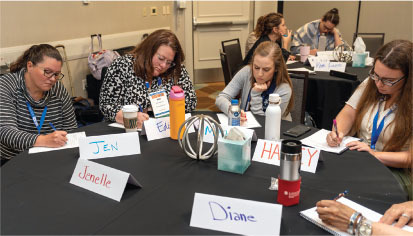May 2014
LEADING INSIGHT
Are You Using Your ‘Infotuition’?
BY SHELLEY ROW, P.E., PTOE
 The very skills that make us great engineers don’t naturally make us great managers and leaders. We are logical, rational, analytical…. What’s not to love? We are in our element with systematic, methodical, and fact-based problems. But, here’s the dilemma: When moving from an engineer to a manager, the very nature of the problems changes.
The very skills that make us great engineers don’t naturally make us great managers and leaders. We are logical, rational, analytical…. What’s not to love? We are in our element with systematic, methodical, and fact-based problems. But, here’s the dilemma: When moving from an engineer to a manager, the very nature of the problems changes.
As engineers, we deal with problems that have well-defined boundaries, linear relationships, a clear objective, and solid underlying principles. These problems are grounded in fact. In the universe of problem types, these problems have comparatively few variables.
The more deeply we move into management and leadership situations, the decisions become more complex. Complex situations have conflicting principles, nonlinear relationships, and no clear definition of success. They have high uncertainty, risk, and emotion. A complex situation is likely to significantly involve people (think about political decisions). Periods of disruptive change (where hindsight does not lead to foresight) also create complexity. In short, complex situations involve many variables. It is in this world that leaders thrive. Complexity is the nature of leadership decision making.
The fewer the variables, the simpler the decision. The more variables, the more complex the decision. Research shows that more complex situations require more intuitive decision making. At the decision point, cognition and intuition are balanced through an internal calculus appropriate for the situation. This balance point is what I call “infotuition.” Infotuition is the intersection of business pragmatics with gut feeling.
We now know, it’s not woo-woo. It’s neuroscience.
Personal interviews with 75 leaders—the majority with technical and engineering backgrounds—reveal their ability to bring an appropriate amount of intuition into their decision making. All but one leader espoused the essential role intuition or gut feeling plays in leadership. This research is validated by many others including the philosopher Spinoza, who said, “Intellect brings the observer to the point where intuition must occur.”
The message is clear: If we as engineers want to become engineer-leaders, we must learn to use our infotuition. To deny infotuition limits our upward career mobility. We have it and we have to use it.
The cognition-intuition balance model was developed by combining neuroscience with these leadership interviews. The model arrays variables from few to many against a continuum of cognition and intuition.
Successful engineer-leaders are those who can skillfully move along the infotuition line to find the appropriate balance point. But, there are stumbling blocks along the way. With too much cognition, you fall into the pitfalls of over-thinking. The prefrontal cortex is the center of rational thought. While powerful, it is slow and takes considerable energy. Plus, it holds limited information, like the RAM in a computer. When we try to process too many variables cognitively, we get stuck and reach for one of the five overthinking crutches such as over-relying on rules, processes, and procedures or overanalyzing facts and figures.
Tip too far in the other direction and we experience the hazards of knee-jerk decisions. Knee-jerk decisions result from habit or fear-based reactions, which come from the basal ganglia and amygdala respectively. These parts of the brain generate fast, easy reactions that can, without conscious awareness, short-circuit rational thought. Apologies may be necessary.
 Engineers who aspire to be engineer-leaders must develop and use infotuition. This involves engaging the corpus callosum. The corpus callosum is the connector in the brain. It integrates fact and feeling, cognition and intuition, left and right sides of the brain. Successful engineer-leaders learn to cultivate both. They gather all the information feasibly available within the given time frame. They pay attention to their neurological system and their self-awareness that feeds intuition. Then they step away or take a break and let the corpus callosum do its thing. That’s when the “aha” moment happens—that creative combination of all factors inside the brain. The good news is that we can learn to develop and cultivate this part of our brain.
Engineers who aspire to be engineer-leaders must develop and use infotuition. This involves engaging the corpus callosum. The corpus callosum is the connector in the brain. It integrates fact and feeling, cognition and intuition, left and right sides of the brain. Successful engineer-leaders learn to cultivate both. They gather all the information feasibly available within the given time frame. They pay attention to their neurological system and their self-awareness that feeds intuition. Then they step away or take a break and let the corpus callosum do its thing. That’s when the “aha” moment happens—that creative combination of all factors inside the brain. The good news is that we can learn to develop and cultivate this part of our brain.
In today’s complex and rapidly changing world, engineers are needed more than ever. Even more important are engineers who combine powerful cognitive skill with equally powerful intuitive skill to become insightful engineer-leaders.
Spinoza was right. With what is known today about the brain, it is illogical not to use all the power in the brain for faster, smarter, and more insightful decisions. Infotuition is an essential leadership and life skill. You’ve got it. Are you using it?
Shelley Row, P.E., PTOE, is a recovering overthinker. She speaks, writes, and coaches on leadership decision making and can be reached at www.shelleyrow.com.


 Volunteering at NSPE is a great opportunity to grow your professional network and connect with other leaders in the field.
Volunteering at NSPE is a great opportunity to grow your professional network and connect with other leaders in the field. The National Society of Professional Engineers (NSPE) encourages you to explore the resources to cast your vote on election day:
The National Society of Professional Engineers (NSPE) encourages you to explore the resources to cast your vote on election day:




